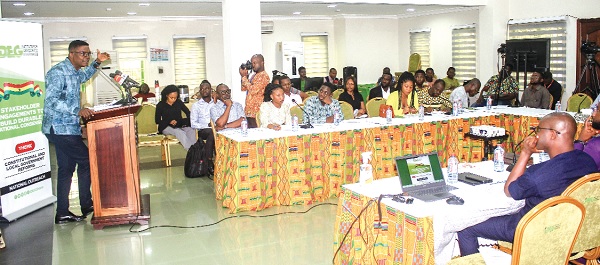
Don’t cede political rights to opponents of democracy - Dr Akwetey urges youth
The Executive Director of the Institute for Democratic Governance (IDEG), Dr Emmanuel Akwetey, has challenged the youth to contribute meaningfully towards achieving local government reforms and building a national consensus for Constitutional amendments for a prosperous nation.
Advertisement
He,however, cautioned that the youth as agents of change and the nation's future leaders must not cede their “civil and political rights” to nation wreckers and opposers of democratic values, believing that the necessary reforms could be achieved through such interventions.
“Consensus building is critical to local government reforms and we are already divided as a nation; the reforms we need depend on the youth, you are the majority voters and you are the group that talks about exclusion,” he stressed.
Dr Akwetey stated this at a stakeholders engagement on building durable national consensus for Constitutional Amendments and local governance reforms and the strategic role of the youth, in Accra last Tuesday.
It attracted students from the University of Ghana, Accra Technical University, the University of Professional Studies, Accra (UPSA) and representatives of the National Union of Ghana Students (NUGS), among others.
Systemic challenges
The director pointed out that creating an enabling environment for political and economic transformation demanded that some systemic challenges must be addressed which the youth could help achieve.
They included making reforms to enhance the performance of Metropolitan, Municipal and District Assemblies(MMDAs) as independent parts of the Executive arm of government; and addressing election overload where political parties prioritised electoral competition over economic policy planning and implementation.
The other systemic issues, Dr Akwetey explained, which needed to be changed were reducing significantly exclusion and marginalisation of various social groups due to the winner-takes-all electoral context.
“The issues on the table, if we pay attention to it and as youth, we mobilise within which ever group we find ourselves we can change the system.
You can vote in the elections but you should also be prepared to vote in a referendum to put pressure on your parliamentarians to vote for the reforms” he emphasised.
He told the youth that the amendment of Article 55(3) of the Constitution remained the most promising avenue for the far-reaching reforms needed to catalyse the nation's democratic and economic transformation.
The way forward therefore, he noted, was how best to build a national consensus.
Mixed member proportion
A Senior Research Fellow of IDEG, Kwesi Jonah, for his part called for the adoption of a Mixed Member Proportional Representation system in local government which would ultimately provide for the needs of marginalised groups such as women, youth and Persons with Disabilities.
The President of the Graduate Students’ Association of Ghana (GRASAG) at the University of Ghana, Peter Mensah, and the Secretary, Union Development of NUGS, Issah Ahmed, expressed concern about the high cost of filing fees and age limits for contesting parliamentary and presidential positions.




